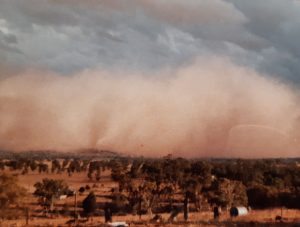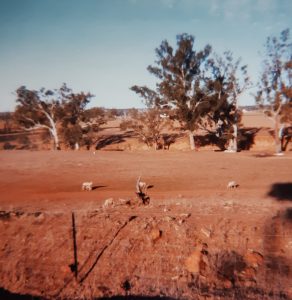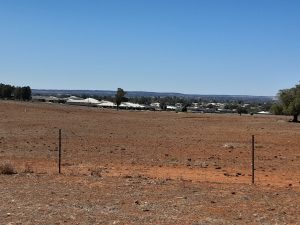8 minute read
Welcome to this week’s Sunday Storytelling blog. Once a month I’ll be sharing a story about an ancestor’s connection to an event in history. At school we learn many things about history, then as we go on with life, we learn more through watching TV, movies or reading books. We learn about wars, disasters, political upheaval and many other life changing times. But have you ever wondered if any of your ancestors lived through a particular event? One of the strongest reminders every year is the commemoration of Anzac Day. Over the years I’ve heard many battles sites mentioned, infamous names such as Gallipoli and Pozieres and I always wondered if any of my ancestors were linked with these sites. I wondered if they had been a part of any other history-making event. And so it is through my research that I’ve discovered many links to various events in history and through this blog I will be sharing some of those connections. Today’s history connection blog relates to probably the biggest story of the last few years, the drought. I grew up on a small farm near Dubbo in the 1980s and I witnessed one of the worst droughts in Australia’s history. In 1982 our paddocks literally turn to dust. We had huge dust storms and from our hilltop home, we saw wave after wave of these angry brown beasts approach and then blanket our home and land. As a keen photographer from an early age, when I noticed another dust storm approach one summer afternoon, I ran to grab the camera to capture it as it passed over us.

As a kid, it was something exciting to behold, although I’m sure the adults were not as thrilled with the thick dust seeping in through the cracks of the house or the loss of precious topsoil. And then last year, the drought became all the more real to me when I was working as an administration temp ringing people around NSW and chatting to them about their current situation. Most of Australia was back in the grip of a devastating drought and I spoke with many people, including farmers, who were absolutely exasperated with the constant waves of dust storms destroying their clean homes and the lack of rainfall devastating their livelihoods.

In September I took a break to drive up to visit my family in Dubbo and whilst we have had a few droughts since that one I remember vividly from 1982, I can honestly say this most recent one was the worst I have ever seen. The green hues normally present in winter had disappeared and been replaced by the browns and reds of the western NSW soils. Sheep were grazing in bare paddocks, desperately searching for a blade of anything edible. Cows sheltered under the sparsely dotted gum trees, too exhausted to move. It was depressing to see so much dull colour in the environment and it really struck me that we had no idea how much longer we would have to endure such intense dryness. In searching for a similar circumstance one of my ancestors had gone through, I remembered a man named James Core, my paternal 5 x great grandfather, on my grandmother Irene’s line. Now James was a bit of a devil and his life will be featured in a future post at some point, so I’m not going to give too much away now. However, when it comes to connections with history and even better, an ancestor’s voice from history, then this one from James is a beauty. James Core was a currency lad, which is another way of saying that he had been born in the colony. His father was a thieving convict and the apple didn’t fall far from the tree for James. James had married into the Bolton family, another notorious early NSW colonial family who would give the government no end of trouble. James himself had been given every opportunity to succeed. He and his brother George were granted 60 acres of land each by Governor Macquarie. The paper trail is a bit thin on the ground so we cannot know exactly how it all came to pass, however James may have sold his land and then got himself involved with the illegal sly grog trade and pig stealing. A couple of gaol sentences followed, but then James appears to have settled down somewhat, trying his best, as per his own submission to the authorities, to earn an honest living.

By 1840, James, his wife and their five children had moved from the Parramatta and Prospect areas they had frequented for years and rented farmland at Penrith, at the foot of the Blue Mountains. The late 1830s had seen below average rainfall and a three-year drought ensued. This was followed by an economic depression. James and his family, as farmers, were badly affected by this drought and in finding themselves reliant on government support again, in September 1840, James wrote a letter to His Excellency, The Colonial Secretary, Edward Deas Thomson, outlining his case for delaying the repayment of a debt he had incurred. James wrote:
‘I am a small settler, residing in this district (Penrith), and have a wife and five children. In consequence of the recent drought I was compelled last year to become a supplicant on His Majesty’s Government for 12 bushels of wheat to support my small establishment. I have lately been furnished with a notice to pay the same and subsequently I have received a letter from the Civil Crown Solicitor stating that if the amount is not paid this day, that he will give a writ against me for the recovery of the sum due. I would wish to acquaint His Excellency with the very humble means I have got to support my family until harvest, and that, were ulterior proceedings to be adopted against me, it would prevent, at the present moment, any possible hope of existence next year. I would therefore solicit from His Excellency the favour of allowing all proceedings to cease against me until after next harvest when I promise that my debt shall be honestly and punctually discharged. Soliciting a reply as early as your other more incumbent duties will allow. I am Sir your obedient servant – James Core.
Unfortunately for James, his reputation did him no favours. He and his wife Maria (nee Bolton) were already well known to the authorities and probably had a thick file! In fairness though, the 12 bushels of wheat amounted to 326 kgs in today’s terms, so it was quite a substantial amount of wheat to have been supplied and a great ask for a small landholder to repay. In receipt of his plea letter, James’s file must have been checked as the reply given to the request shows that the government kept tabs on its citizens. The police report reads as follows:
‘Sir, we have the honour to return the petition of James Core praying to be allowed time to take up his promissory note for twelve pounds on account of seed wheat supplied by the Government and to report thereon for the information of His Excellency the Governor, that the petitioner is not a reputable character…and that we have been informed he has himself been preparing to leave the district with the view of evading the claim. Under these circumstances we cannot recommend that proceedings should be stayed but would suggest that a verdict should be obtained when it will still be optional to delay levying should it be desired.
It is not known how James got on with the repayment of the loan. There are no records for him from here until 1851, when he was then residing on a small farm at Lambridge Estate, just near the Nepean River and the township of Penrith itself. A year later James and his family would up stumps for the goldfields of central west NSW, settling in Sofala, where James made his living as a hawker, selling wares to miners. Perhaps James repaid the debt for he was able to keep himself out of gaol during the 1840s. Either way, James and his family did survive and quite well in fact, despite the period of hardship they endured and better times were had in the following decades. To hear direct through time from an ancestor is rare and I’ve only a handful of examples from my many hundreds of ancestors. That is what makes this letter from James so important to the historical record of my lineage. The letter helps me understand James; for example, that although he had been in trouble with the law on numerous occasions previously, he was in no way shy about asking for more help and if you like, sucking up to the authorities to get what he wanted or needed. He boldly flouted the law when it suited him and then when his circumstances demanded it, he used his lawful rights to plead his case for leniency. As a free man in NSW, he knew he held a higher standing than many of his fellow citizens, such as the current or former convicts of the colony and as a result, on this occasion and on other occasions prior, James used this slight advantage to demand his rights and his entitlements.
Now, it’s your turn. What documents do you have or can you find that have your ancestors speaking from beyond the grave? What connection with an event in history do they have? And what can these little gems tell you about your ancestors?
